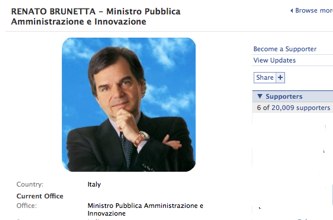Nicola Bruno mi ha intervistato ieri per il Manifesto per parlare di Facebook, la censura dei contenuti pubblicati su Internet, e gli eventi di attualita’ politica degli utlimi giorni – l’intervista e’ pubblicata sul Manifesto del 15/12/2009: «Facebook che istiga all’odio? Mi sembra solo un’esagerazione che dimostra una totale mancanza di cultura digitale. Quello che succede online non è altro che la fotocopia della vita politica di un paese. Ci possono essere espressioni forti, ma per lo più più si tratta di semplice condivisione estemporanea di opinioni, come nelle chiacchiere da bar. Non c’è bisogno di nessun oscuramento». […]
Tag: facebook
New article published: Political Protest Italian Style
The article I co-authored with my colleague Alberto Pepe, from UCLA, has been published in the December Issue of First Monday: “Political protest Italian–style: The blogosphere and mainstream media in the promotion and coverage of Beppe Grillo’s V–day” First Monday, Volume 14, Number 12 – 7 December 2009.
Here is the Abstract:
We analyze the organization, promotion and public perception of “V–day”, a political rally that took place on 8 September 2007, to protest against corruption in the Italian Parliament. Launched by blogger Beppe Grillo, and promoted via a word–of–mouth mobilization on the Italian blogosphere, V–day brought close to one million Italians in the streets on a single day, but was mostly ignored by mainstream media. This article is divided into two parts. In the first part, we analyze the volume and content of online articles published by both bloggers and mainstream news sources from 14 June (the day V–day was announced) until 15 September 2007 (one week after it took place). We find that the success of V–day can be attributed to the coverage of bloggers and small–scale local news outlets only, suggesting a strong grassroots component in the organization of the rally. We also find a dissonant thematic relationship between content published by blogs and mainstream media: while the majority of blogs analyzed promote V–day, major mainstream media sources critique the methods of information production and dissemination employed by Grillo. Based on this finding, in the second part of the study, we explore the role of Grillo in the organization of the rally from a network analysis perspective. We study the interlinking structure of the V–day blogosphere network, to determine its structure, its levels of heterogeneity, and resilience. Our analysis contradicts the hypothesis that Grillo served as a top–down, broadcast–like source of information. Rather, we find that information about V–day was transferred across heterogeneous nodes in a moderately robust and resilient core network of blogs. We speculate that the organization of V–day represents the very first case, in Italian history, of a political demonstration developed and promoted primarily via the use of social media on the Web.
Joe Green on Facebook Causes
Live blogging from the workshop “From Social Network to Social Movement” at Harvard Law School. Joe Green, Founder of Facebook Causes is presenting. You can also follow on Twitter: #HLSsocnetworks
Facts on Facebook Causes: 50 million people using it, 250.000 active causes, 7 million dollars raised, average donation $22
(1) Why does FB matter? 200 million people using it. This is the Internet getting real. Community online at the beginning was people in Usenet groups talking about Star Wars using pseudonyms. Real identity online has been a holy grail for a long time. Facebook profiles on the other hand use real names [CdG = is this equal to real identities?] – so it is much harder now to fake identity than before. Social graph – there are nodes and connections between the nodes – the nodes being people. That allows real world social dynamics to be brought on the Internet. Continue reading “Joe Green on Facebook Causes”
Ben Rattray on Change.org
Live blogging from the workshop “From Social Network to Social Movement” at Harvard Law School. Ben Rattray, Founder and CEO of Change.org is presenting. You can also follow on Twitter: #HLSsocnetworks
Rise of the social web has been huge. Activism by proxy – people are interested in organizations and these organizations act on their behalf. They get information from direct email and the organization acts. People by themselves are unable to take action at the national level so they need proxies, outside of traditional media, for example through blogs. The Web would disintermediate existing organizations, allowing people to get together and collectively running action. So we have a toolset to create action and to allow NGOs to organize. Continue reading “Ben Rattray on Change.org”
David Lazer on the properties of network power
Live blogging from the workshop “From Social Network to Social Movement” at Harvard Law School. David Lazer from the Harvard Kennedy School is presenting on the properties of network power. You can also follow on Twitter: #HLSsocnetworks
Definition of network: a network is a set of units (be them people or organizations) and a set of attachments amongst those units. Definition of power: 1) Individual and group access to resources. Where you are in the network influences your access to resources. How does power flow from people who have power to actual formulation of policy? 2) Collective capacity to organize – how do networks enable or inhibit the growth of certain social movements? Continue reading “David Lazer on the properties of network power”
the new facebook home page
In the past couple of days Facebook has been rolling out to its users a new homepage. This is the second time that Facebook changes dramatically its look. While there was great upheaval against the first change in the home page compared to the original Facebook (where fun applications, superpoking and friend hugging held center stage), I think it can be safely argued that the change was a great improvement in terms of making Facebook a much more functional website where to share information (in the form of links, photos and news feeds) with other people in your network.
This second change in the look of Facebook, however (which now makes your homepage very much look like Twitter, a site which has been growing exponentially in popularity) has a new rationale behind it. It is not anymore about making the sharing of information with your friends easier, it is about providing real time access to information about your friends. Indeed, status updates now appear to be the same as any other wall post made by your friends, while finding out about other friends activities (posting of photos, groups joint, people friended) is now messy and more difficult. Continue reading “the new facebook home page”
Internet censorship arrives in Italy
[youtube width=”315″ height=”235″]http://www.youtube.com/watch?v=pLsyLEwIFVc[/youtube]
In an effort to regulate the Internet, as part of a package of laws to safeguard national security, the Italian Government has recently proposed an amendment which in practice – if approved – would oblige all Italian ISPs (Internet Service Providers) to block a site (be this a website, a blog or a social media site such as Facebook or Youtube) where material has been posted which is believed to defend or instigate a crime [Bloomberg’s reporting the news here].
This amendment does not talk about merely deleting the material which is believed to be criminal/illegal but about filtering/blocking/blacking out/preventing access to the entire website if the manager of the site did not take down such material. For example, if Facebook did not shut down groups such as the ones which have recently come to the spotlight for praising Mafia bosses, Italian ISPs would be in fact obliged to block access to the whole of Facebook, or be fined (from 50,000 to 250,000 Euros).
The decision of whether such material is in fact illegal would not go to the Courts of Law but would be taken directly by the Minister of the Interior, with no opportunity for trial in front of Magistrates. The amendment has already been approved by the Senate and is waiting to be discussed at the Chamber of Deputies.
Commentators from blogger Beppe Grillo to Italian politician Antonio di Pietro have voiced their protests against this amendment which – if it becomes law – would in fact curtail freedom of expression — and potentially allow the shutting down of thousands of voices on the Web. According to di Pietro [English version here] the amendment is unconstitutional and anti-democratic thereby putting Italy in the same situation of countries such as China and Burma where Internet filtering is widespread. In his blog Beppe Grillo reports an interview with Senator D’Alia [English version here] where the Senator explains how the amendment would in fact work.
A group has been created on Facebook against this amendment – where materials such as editorials and comments can be found – for more information see also: http://www.baoad.it/facebook-censored/.
CONTRO LA CENSURA DELLA RETE E DI FACEBOOK
understanding the Internet: Italian politicians go online
More and more Italian politicians have been jumping on the Internet bandwagon. The Education Minister Mariarosa Gelmini has started a YouTube channel, where she announces with a video that she hopes this channel will allow her to listen to people’s opinion, in order to “implement change together”. The video has reached 260,000 views since it was posted a week ago, and 8,000 comments. A few days ago, Renato Brunetta, the Minister for Public Administration and Innovation, has opened a Facebook page, gathering around 14,000 supporters and around 1,200 wall posts/comments. He also posts a video, in which he states that this is his first effort to reach people online, so that they can contact him with their views, and he hopes in this way he will also be able to keep them posted about his initiatives and activities. Continue reading “understanding the Internet: Italian politicians go online”
the Internet and politics: analyzing the 2008 US election
A group of McCain and Obama campaigners, academics, activists, bloggers and journalists have gathered for two days at Harvard at a conference organized by the Berkman Center for Internet and Society examining the role that the Internet has played in the the 2008 US election. Parts of the conversation were under Chatam house rule, nevertheless here are some highlights of the lively discussions that have taken place. Some preliminary outputs of the meeting can be found here in essay format and other Berkman colleagues have blogged about the event here and at the Internet and Democracy blog.
The first day of the discussion focused very much on the role played by the Internet in the campaign. Did Obama win thanks to the Internet? Did the Internet play a role in engaging people who would have not otherwise been engaged? The first question was prominent, and the message that was stressed many times over and over, especially by Obama campaigners, was that the Internet served as a wonderful tool to coordinate and link online and offline action, with the technology playing a central but complementary role to the efforts of offline grassroots organizing. I came home with the feeling that top-down strategy played the key role in getting people involved, but that success depended very much also on the bottom-up grassroots efforts and energy that Obama and his campaign people managed to mobilize and draw upon. Continue reading “the Internet and politics: analyzing the 2008 US election”


